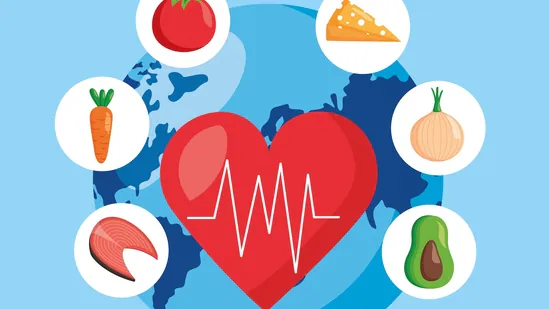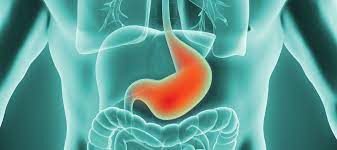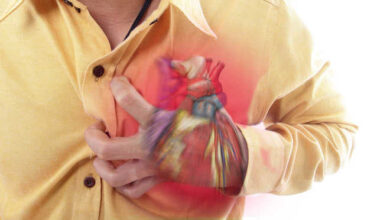Can excessive exercise and improper diet lead to cardiac arrest? Advice on Heart Protection
We all know that food and exercise are important factors in heart health, but in today’s fast-paced society, where convenience often takes precedence over health, the effects of unbalanced nutrition and excessive activity on our overall health cannot be understated. Our general health is largely dependent on our nutrition, and when it is improperly managed or unbalanced, there may be dangerous repercussions.

Dr. Ripen Gupta, Senior Director and Unit Head of Cardiology at Max Smart Super Speciality Hospital in Saket, New Delhi, stated in an interview with HT Lifestyle that obesity, high blood pressure, and high cholesterol levels are all consequences of a diet heavy in processed foods, saturated fats, and sugars.
These conditions include cardiac arrests. This was shown by US research that found that a diet heavy in meat and saturated fats, or the “southern diet,” caused more cardiac arrests than a diet high in fruits, vegetables, skim milk, and lean meats and fats like fish and chicken. However, insufficient consumption of vital nutrients like fiber, vitamins, and minerals may weaken and affect the heart muscle’s ability to contract, increasing the heart’s vulnerability to unexpected cardiac events.
“Similarly, over-exertion can put undue stress on the heart and increase the likelihood of cardiac arrests, especially when combined with poor nutrition,” he said. Taking part in high-intensity physical exercises without enough preparation or recuperation period may cause illnesses such as myocardial infarction or arrhythmias, which are irregular heartbeats that might possibly be fatal. Furthermore, overexerting the body without sufficient fuel in the form of a well-balanced diet may lead to the depletion of energy reserves, deterioration of muscle function, and jeopardize the heart’s capacity to adequately pump blood.
In order to tackle these problems and lessen the dangers of improper food intake and excessive physical activity, Dr. Ripen Gupta proposed that a comprehensive approach to health and wellness is crucial. “This includes limiting the consumption of processed and sugary foods and adopting a balanced diet rich in fruits, vegetables, whole grains, lean proteins, and healthy fats,” he said. Additionally, strengthening the heart, enhancing circulation, and lowering the risk of cardiac events may all be achieved by including regular physical exercise in our daily routines, with an emphasis on progressive progression and enough rest.
The correlation between inadequate diet, excessive physical activity, and cardiac arrests highlights the need for well-informed decisions that put our hearts’ health first. We may actively move toward a heart-healthy lifestyle by being aware of what we eat, how we exercise, and how these things affect our cardiovascular system. To ensure a long and happy life, let’s work to protect our hearts, move with purpose, and feed our bodies.
Dr. SS Sharma, Mentor and Chief Clinical Advisor at Heartnet India, echoed that unmeasured nutrition and overexertion do lead to cardiac arrests by sharing that “stress-induced overexertion and obesity pose significant threats to heart health.” A diet reduced in saturated fat and salt reduces the incidence of cardiac arrests and heart disease. On the other hand, a diet high in processed meats, fried meals, added fats, and sugar-filled beverages is associated with a higher risk of sudden cardiac arrest. Heart attacks are more likely to occur when a person adopts unhealthy lifestyle habits including smoking, binge drinking, and overexerting oneself physically or mentally.
Dr. SS Sharma advised against overexertion, warning that it can have a negative impact on heart health and cause arrhythmias that can progress to sudden cardiac arrest.
He said that maintaining a healthy balance through regular exercise, a balanced diet, and appropriate blood pressure and cholesterol levels is essential for both physical and mental well-being, ultimately leading to a healthier heart. Eating meals that are appropriately sized guarantees that you are getting enough nutrients, helps you maintain a healthy weight, and lowers your risk of heart disease.
Heart disease may be avoided by eating a diet high in plant-based foods, whole grains rather than processed ones, low-fat dairy, and nuts and seeds. Developing sound sleeping practices lowers the chance of heart-related problems even more. Precautionary steps for preserving ideal heart health may be guided by evaluating genetic predispositions and seeking medical guidance for tailored exercise regimens.
He further said that “having healthy sleep habits reduces the risk of heart-related issues.” Adopting a healthy lifestyle may prevent premature heart disease-related deaths by 80%, drastically reduce the risk of ischemic strokes by 50%, and drastically reduce the risk of coronary artery disease by over 80%.
Therefore, maintaining good physical fitness and leading a healthy lifestyle are essential for protecting heart health. A doctor’s advice is essential for a customized diet plan based on each person’s demands. This lowers the risk of cardiovascular illnesses by ensuring appropriate advice, particularly for those with underlying medical disorders like diabetes or a history of heart failure or attacks. In addition, seeing a doctor and getting regular checkups for blood pressure, cholesterol, and other health issues help with preventative care and lower the risk of heart disease.







